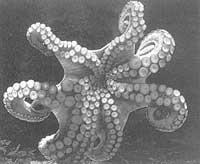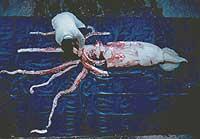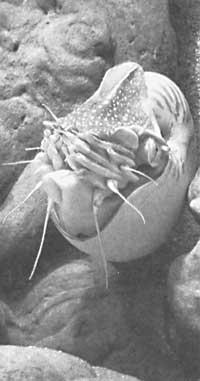Intellectuals under waves
2001/05/13 Roa Zubia, Guillermo - Elhuyar Zientzia
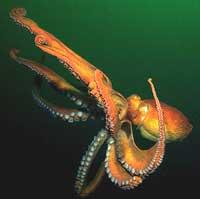
Octopus and squid have put in danger the monopoly of the intelligence of mammals. We must recognize that we do not know the capacities of these beings of great flexibility in the deep sea.
When you're reading this text, you're still sitting at a bar table eating chipirones. Also, when you come to ask for the snack, you have found in the bar a octopus to the Galician, tempting the customer. Both sweet and white pieces that you have spiced lemon.
The chipirones and octopus are easy to catch. They do not seem to be very fast. However, biologists are surprised. Some of the experiments carried out in recent years have had a prominent behavior. We have seen in television reports their skills. Furthermore, they have shown that things have the capacity to learn. According to the experts, it has not been a nonsense. Their ability to learn is not the only thing that has left scientists destroyed, but also fascinated them to learn by imitation.
Learn by playing playing
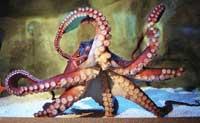
Laboratory octopus (does this term make sense?) They have learned to see what the local comrades do, that is, they have shown that they can repeat what another octopus does whenever they want. For example, one has learned to catch a red ball and discard the white. It is an animal that distinguishes not only the colors, but also the size, appearance and reflections of things.
The experiment has generated a debate and a deep reflection. Octopus have shown their ability. But ethologists, scientists who analyze the behavior of animals, do not understand why a cephalopod needs that capacity. The octopus are very solitary animals. And it is that they only meet to copular.
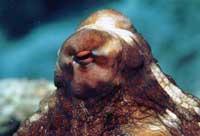
The brains of cephalopods and mammals are independent. Each one has followed his evolutionary path and, therefore, his structure is different. But that does not mean that we have more powers. According to experts, the ability to learn through observation shows that cephalopods are very smart. Neurobiology has a new challenge. In addition to the octopus, we must study the squid, the corners and the nautilos. However, according to some scientists, octopus and squid are very charming animals, so their powers have often increased. Few have been the obstacles that have made it difficult for the eyes of the great squid to relate to the mind.
The charm of the body
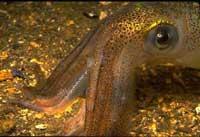
Cephalopods are not only animals that have fascinated biologists. Well thought out, they are a great design of nature. They are molluscs, but they are much more attractive than clams or bazos. Among them, the oldest is the nautical, living witness of his time. All others move by jet propulsion, get food by hunting, segregate ink, and use effective defense systems against enemies.
Of less than one centimeter and 18 meters, they can be found in the sea of all sizes. About 700 species are known and are present in all oceans. Some live very close to the surface and others at 7,000 meters deep, which we know. Undoubtedly, the giant squid are the most spectacular and, at the same time, rare. And it is that none has yet been achieved.
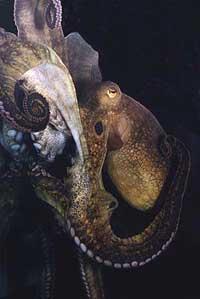
They are apparently rare animals. For example, they have been given the name because they have the tentacles tied to the head. The human being has often taken as a model and also in nature there is a great variety. Squid, for example, are neuron-shaped beings that have a couple of longer tentacles as if it were an axon of binding with the adjacent neuron. The corner, however, is of submarine aspect
Cephalopods have very developed senses. They have developed touch, taste and smell. They are very sensitive to gravity, obtaining good muscle coordination. It has been proven that some also have ear. The corners have a lot of small hairs in the body to ‘read’ the movements of fish in water movements.
Life of colors
This kind of senses, however, does not require such a large brain. Scientists believe there must be another reason and some have offered an opportunity. Color change can be the goal of this specialized brain. There are no animals capable of changing color like cephalopods. They get it through their superficial chromatophores. These organulites are bags loaded with pigments. They can camufar in the seabed for a second and give any design to the skin when necessary. The studied corners can choose about 35 patterns, regardless of the color of the area. It has also been seen the ability to show the two faces in different colors.
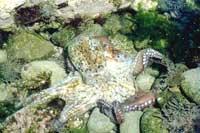
Several scientists have recognized this ability as a language of cephalopods. This is an explanation that responds to the same hypothesis of specialization of the brain. One of the objectives of current studies is to analyze the ability to make decisions. In these tests the intrinsic behavior of an animal has been explained, that is, not all have the same behavior in the same conditions. In the most spectacular case, one of the investigated corners developed a spectacular hunting technique. When the prey approached, it secreted ink and, hidden in it, it hunted. Any other laboratory animal did not. Researchers believe it is the sign of the sophisticated brain. Do octopus, squid and txokos keep more secrets? What you put in the mouth, at least, better if you treat it with another dignity, because it is very fast.
Published in 7K

Gai honi buruzko eduki gehiago
Elhuyarrek garatutako teknologia



